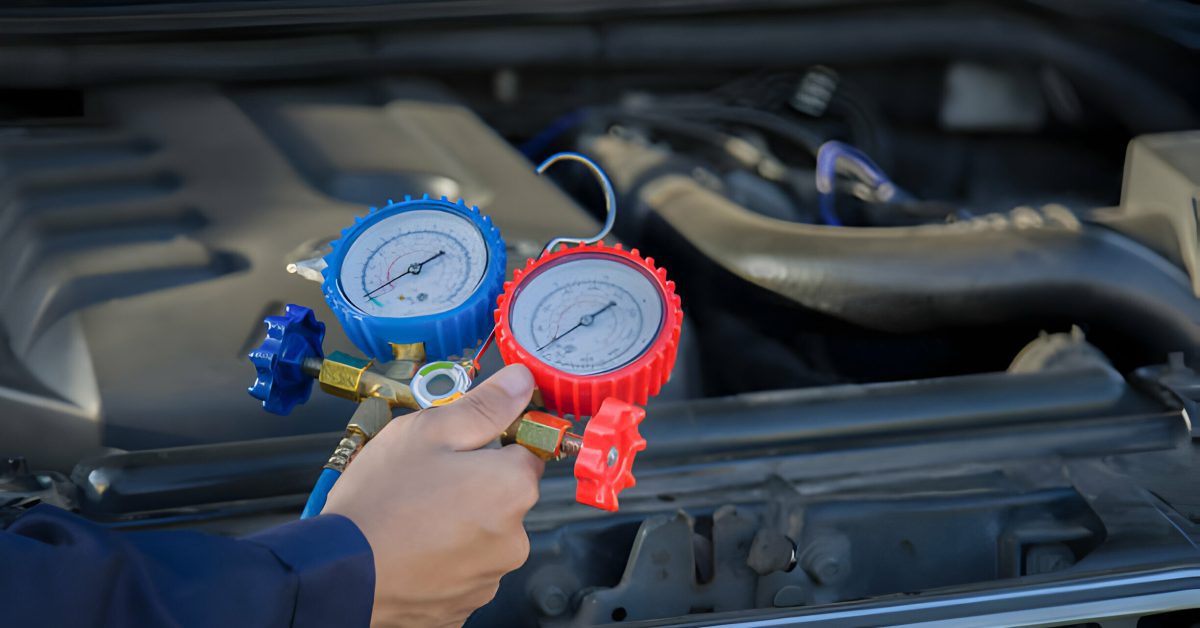In the sweltering heat of summer or any warm day, the last thing anyone wants is to be stuck in a car with inadequate cooling. The key to that refreshing blast of cool air in your vehicle is something called a car refrigerant, a critical component in your car’s air conditioning (AC) system. Understanding the intricacies of car refrigerants, including what is commonly known as Freon, is essential for every vehicle owner. Not only does it enhance comfort, but it also plays a vital role in the overall maintenance and performance of your vehicle’s cooling system.
What Is Car Refrigerant?
At its core, a car refrigerant is a fluid that absorbs heat from the car’s interior and releases it outside, thus cooling down the vehicle’s cabin. It operates in a closed loop within the air conditioning system, undergoing a continuous cycle of compression and expansion. This process effectively removes heat and humidity from the air inside your car, replacing it with cooler air.
What Is Freon for Cars?
Freon, a term often used interchangeably with refrigerant, refers specifically to a group of chlorofluorocarbons (CFCs) that were once commonly used in vehicle air conditioning systems. Renowned for its efficiency in cooling, Freon became a staple in automotive AC systems for decades. However, it’s crucial to note that due to environmental concerns, particularly its role in depleting the ozone layer, the use of certain types of Freon has been phased out in favor of more eco-friendly alternatives.
The Transition from Freon to Environmentally Friendly Refrigerants
The automotive industry’s shift from Freon-based refrigerants to more environmentally friendly alternatives marks a significant milestone in global environmental conservation efforts. The discovery of ozone-depleting properties of chlorofluorocarbons (CFCs), including R-12 (a common type of Freon used in cars), led to international agreements such as the Montreal Protocol. This global treaty aimed at phasing out substances that significantly deplete the ozone layer, including certain refrigerants.
In response, the industry introduced hydrofluorocarbons (HFCs), such as R-134a, which do not harm the ozone layer. More recently, even more environmentally friendly refrigerants like R-1234yf have been developed, which have a much lower global warming potential (GWP) compared to their predecessors. These advancements reflect the automotive industry’s commitment to environmental sustainability and the crucial role of refrigerants in achieving these goals.
Why Refrigerant Is Essential for Your Vehicle’s Cooling System
Refrigerants are the lifeblood of your vehicle’s air conditioning system. They are essential for several reasons:
Temperature Regulation: The primary role of the refrigerant is to absorb heat from the car’s interior and expel it outside, thus cooling the cabin air efficiently.
System Efficiency: The right type of refrigerant ensures that your AC system runs smoothly and efficiently, reducing wear and tear on the components and potentially lowering fuel consumption due to less strain on the engine.
Environmental Protection: Using the correct, environmentally friendly refrigerant minimizes the vehicle’s ecological footprint by reducing harmful emissions that contribute to global warming and ozone depletion.
Understanding the critical role of refrigerants not only in the functionality of your car’s AC system but also in environmental conservation, underscores the importance of proper refrigerant management and maintenance.
Maintaining Your Car’s Refrigerant Levels
Regular checks and maintenance of your car’s refrigerant levels are crucial for the optimal performance of the air conditioning system. Here’s how to ensure your system remains effective and efficient:
Signs of Low Refrigerant Levels
Reduced Cooling Capacity: The most noticeable sign is a significant decrease in the cooling efficiency of your AC system. If the air isn’t as cold as it used to be, it’s likely time to check the refrigerant.
AC Clutch Fails to Engage: If the refrigerant level is too low, the AC compressor clutch will not engage, preventing the refrigeration cycle from starting.
Visible Leaks or Stains: Sometimes, refrigerant leaks can leave oily residues near AC components. If you notice any unusual stains or leaks under your car or around the AC unit, it might indicate a refrigerant leak.
Hissing Sounds: Leaks in the refrigerant lines can sometimes produce hissing sounds, especially when the AC is turned off.
How to Check Refrigerant Levels
It’s essential to note that checking refrigerant levels isn’t straightforward and often requires professional equipment and expertise. Unlike oil or coolant levels, you can’t simply open the hood and check the refrigerant level. Therefore, it’s advisable to seek professional services for accurate diagnostics and refilling.
When to Seek Professional Service
Routine Maintenance: Even if there are no obvious signs of trouble, it’s a good practice to have your AC system checked by professionals regularly.
Upon Noticing Signs of Low Refrigerant: If you experience any of the signs mentioned above, it’s critical to get your AC system checked to prevent further damage.
Understanding car refrigerants and the transition from Freon to more environmentally friendly alternatives is crucial not only for optimal vehicle maintenance but also for our environment. Regular checks and professional maintenance of your car’s refrigerant levels are essential steps toward ensuring your air conditioning system operates efficiently, enhances your driving experience, and aligns with global environmental conservation efforts.
Don’t let a poorly performing air conditioning system affect your comfort or contribute unnecessarily to environmental harm. Take action today by scheduling a comprehensive cooling system check-up with our expert technicians. Visit Metric Motors to learn more about our services and how we can help you maintain your vehicle’s cooling system for optimal performance and environmental sustainability. Remember, taking care of your vehicle’s cooling system is not just about comfort—it’s about making a conscious choice for a better planet.
Click here to schedule your service appointment now and ensure your vehicle is cool, comfortable, and environmentally friendly. Together, we can make a difference—one car at a time.




